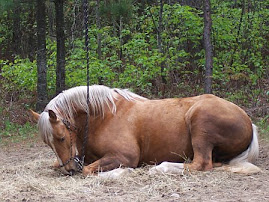

"From the TB Friends blog today:
"Here is a documented fact: Storm Cat has a stud fee of three hundred thousand dollars [note; his stud fee is actually $500,000 and his stud book for this year is full]. Since 2001 we have rescued 14 of his sons and daughters for an average price of 35 cents a pound"."
This quote is cited on one of my favorite blogs, Fugly Horse of the Day; it is followed by a question: what to do about the the problem of oversupply of race-bred thoroughbred horses? StormCat is a particularly egregious case because his temperament is somewhat difficult and he is prepotent for passing on the attitude along with the speed. His sexual favors earn his owners around $50,000,000 a year; but his offspring once retired do not always fare so well.
What are your thoughts on thoroughbred racing? No question they were bred for this; their ancestry goes back to British racing nuts who created them from Arabian imports in the 18th century with two thoughts in mind: 1. racing, and 2. winning. Every horse person has a different image of equine perfection; for me it is always a thoroughbred. Those long legs, that lean profile, that refined head and above all, that walking-on-air suspension, like their feet barely touch the earth. I know they aren't the best all-around horse, whatever that might be; but to me they are almost divine and I would like to die while looking at a thoroughbred (preferably not as I fly through the air off his back!).
My own personal piece of the thoroughbred racing industry (in the pictures, galloping and doing a bit of dressage) is now 14 years old. I got Montana -- "Who's Dancer", out of Flying Lily by Angel Who -- when he was 7 and had been off the track for awhile but not doing much. He raced up and down the west coast and won a career total of $217,000. He has the mind of a 3-year old, the age at which he won the most money oddly enough, and probably always will: questioning, reacting, enjoying, hamming it up, delighted by a peanut butter sandwich almost to the point of meltdown, affectionate as the day is long. Like most off-track thoroughbreds he was inexpensive. He saw me through a heartbreaking divorce when all I did was cry on his neck, too sad to even ride. Do horses understand sorrow? I suspect they do; their emotional intelligence is different from ours but very nuanced.
So he is my beloved friend, brought to me by the racing industry. And the racing industry has me conflicted. I thrill to the sound of the starting horn; I love watching the horses ponied out to the starting gate, muscles rippling in the light, their restless eyes searching the crowd and nostrils flared. I love the way they fly across the ground. And I understand how dangerous their lives can be. And when they stop winning, or stop trying to win (as usually happens), or get injured (as happens far too often), where do they go?
Many of the big breeding farms donate to support re-homing efforts for the retired racehorse. Many small breeders take that responsibility on themselves, bringing their thoroughbreds home to retrain and sell on for a second career as someone's riding partner. But too many of these beautiful animals still go to waste, ending up on dinner plates or in rendering plants before they've had a chance to be simple horses with quiet lives. At www.fuglyhorse.blogspot.com, a blog devoted to criticizing 'backyard breeders' and other horse-wasters, you will see occasional discussions of these and other issues relating to unwanted/homeless horses. Let me know your thoughts.


No comments:
Post a Comment